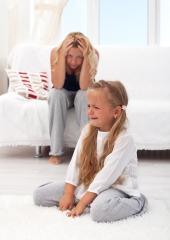At the risk of oversimplifying things, I find there are two parenting models out there: the sculptor model and the shepherd model. One of these models tends to be overwhelmingly subscribed to by parents (at least in my experience) while one is overwhelmingly favored by the extant science. Let me summarize each model and review implications.
In this model children are born like a lump of clay. Parenting then sculpts the personality. This is thought to happen through direct interactions and the various choices that parents make for their children. The personality of the child, which the parent has created, then determines that child’s success across important domains (e.g., social life, extra curricular engagements and academics).
Based on the spin of the genetic roulette wheel, children are born with temperamental strengths and vulnerabilities, as well as talents and weaknesses. These assets and liabilities are then manifested along a modest continuum of possibility based on the child’s experiences (the modest range is heavily influenced by genetics). Those experiences are comprised of many elements. A few of of these elements are in a parent’s exclusive control (e.g., how a child is disciplined). However, many others are only partially (e.g., the quality of the child’s education) or not at all in parents’ control (e.g., the parent is unable to generate more income and so needs to live in a city where crime runs high).
Implications
 In the sculptor model parents often feel a great burden. There seems to be an endless stream of confusing and complex decisions to make. And, it often feels like the correct decision could generate highly positive outcomes while the wrong decision could result in a crushing experience. In this model parents beat themselves up for their child’s failings and failures (i.e., if only they had sculpted better). They also can be merciless with themselves about their mistakes; after all, it can feel like an undisciplined stroke of the chisel just caused a child’s arm to fall off.
In the sculptor model parents often feel a great burden. There seems to be an endless stream of confusing and complex decisions to make. And, it often feels like the correct decision could generate highly positive outcomes while the wrong decision could result in a crushing experience. In this model parents beat themselves up for their child’s failings and failures (i.e., if only they had sculpted better). They also can be merciless with themselves about their mistakes; after all, it can feel like an undisciplined stroke of the chisel just caused a child’s arm to fall off.
In the shepherd model parents realize that their role is critically important.  However, they also realize that there are many aspects of their children’s outcomes that are outside of their control and influence. The latter realization doesn’t cause parents to dial it in. But, it can open the door to practicing psychological principles like the Serenity Prayer. Moreover, they realize that failure is a critically important part of a healthy childhood. Subscription to this model doesn’t do much to mitigate a parent feeling pain when a child experiences a poor outcome but it can mitigate feelings of guilt and shame.
However, they also realize that there are many aspects of their children’s outcomes that are outside of their control and influence. The latter realization doesn’t cause parents to dial it in. But, it can open the door to practicing psychological principles like the Serenity Prayer. Moreover, they realize that failure is a critically important part of a healthy childhood. Subscription to this model doesn’t do much to mitigate a parent feeling pain when a child experiences a poor outcome but it can mitigate feelings of guilt and shame.
In my experience most of we engaged parent-lunatics subscribe, intentionally or not, to the sculpting model. And, this makes us even more crazy than our default position. However, the available science overwhelmingly supports the shepherding model. (Disengaged parents may talk up the shepherding model, but that is just a rationalization for the fact that they are napping while the sheep are grazing.)
I’ll give you one brief illustration. I know a mom who experienced an upbringing that was mostly neglectful and abusive. Therefore, she took the SAT without any preparation; moreover, she took the test on the heels of a solidly average public school education. When it came time for her first born son to take the SAT she made sure that he had the tutors and study guides needed to well prepare. Moreover, his testing happened on the heels of a highly optimized education. However, the son ended up scoring only 90 points higher than the mom (the father never took the SAT). 90 points is about a 10 to13 percentile point difference. So, is that an important difference? Yes. Is it ultimately determinative? Hardly.
 My closing wish is that we can all remember that we are shepherds. Surely, we can study “effective shepherding” manuals. However, we can also realize that there is much about our children’s outcomes that is outside of our control and that we are destined to mess up a lot, but that won’t make him or her a homeless, drug addicted, serial killer with no friends and bad hygiene.
My closing wish is that we can all remember that we are shepherds. Surely, we can study “effective shepherding” manuals. However, we can also realize that there is much about our children’s outcomes that is outside of our control and that we are destined to mess up a lot, but that won’t make him or her a homeless, drug addicted, serial killer with no friends and bad hygiene.


